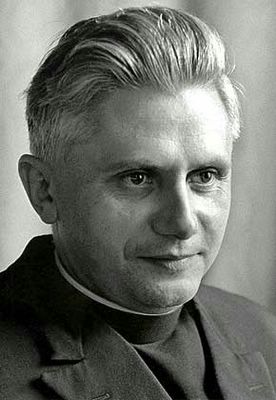
Joseph Ratzinger in an older photo

"The American soldiers photographed us, the young ones, most of all, in order to take home souvenirs of the defeated army and its desolate personnel."
I assume this quote is from Ratzinger's book,
Milestones: Memoirs 1927-1977. The fact that he has been in very low and very high places in his life (he spent time as a POW) has got to be a good thing in his new position as Pope. Deserting the Nazi army at eighteen is also heroic, especially when it meant risking death to do so. It suggests that he knows being right has nothing to do with being on the right 'side' or wearing the 'right' uniform. More from this article
here, including some interesting quotes.
There is a simple biography of the new Pope at the
US Bishops' website.
This
Telegraph article also casts an interesting light on the man:
his favoured images are of survival, preservation of treasure, and of the regrowth of the Church from a tiny grain of mustard seed. He admires Englishmen such as Thomas More and Cardinal Newman - "a man who listens to his conscience and for whom the truth that he has recognized... is above approval and acceptance, is really an ideal and a model for me"
... he was not a man living in the past, but rather one tackling with a civilised and clear mind the new challenges of human thought. The third, surprising characteristic, was his openness: friendly, relaxed, almost chatty, always trying to answer any question put.
The cardinal struck me as a man happy in himself, though sorrowful about the state of the world. He was hopeful, however. He takes inspiration from the chance that he was born on Easter Eve: "I find that a very good day, which... hints at my conception of history and my own situation; on the threshold of Easter but not yet through the door."
This article from the German magazine
Spiegel is surprisingly friendly:
Germans can now hope that this pope will provide them with the same kind of encouragement and hope that Karol Wojtyla once gave the Poles.
This pope, whose rivals didn't hesitate to point out, just in time for the conclave, that he was once a member of the Hitler Youth, underwent a cosmopolitan transformation in the 1970s, rising to become one of the Church's most prominent theologians. This pope is something of an apotheosis of the biography of a German.
Of course,
not everyone is happy:
theologian Hans Küng, another Catholic critic forbidden by the Vatican from teaching and a former school colleague of Ratzinger called the choice a "huge disappointment" for all those focused on reform, though he said the new pope, 'like a US president" should be accorded 100 days to learn his new job.
In the same sour direction
David's Mediencritik notes that:
Germany's conspiracy theorists are also likely to come up with an elaborate explanation of how Bush, the CIA and the neo-cons planned the entire election to create divisions within Germany and the "progressive-wing" of the Catholic Church. Antje Vollmer of the Green party is also certain to have an explanation for these latest developments as well.
Yes, and we're just dying to hear it. Do tell.
Benedict XVI may need his courage in Germany and in western Europe most of all. It will take some doing to woo his countrymen. Should he succeed, we might be able to look forward to better Atlantic relations than we have at the moment. And Canada, with a very large and influential western European province at its heart, might benefit from success in this task as well.
 Joseph Ratzinger in an older photo
Joseph Ratzinger in an older photo 
Comments